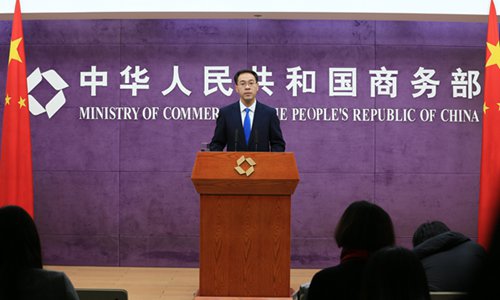HOME >> BUSINESS
Beijing opposes US abuse of export controls
By Huang Ge Source:Global Times Published: 2019/6/27 22:23:40
US abusing export controls: official

Photo source: mofcom.gov.cn
The Ministry of Commerce (MOFCOM) on Thursday expressed strong opposition to the US abusing export control measures via an entity list against Chinese technology companies, urging Washington to stop its crackdown on Huawei.
Year-to-date, 47 Chinese companies and organizations have been put on the US entity list, Gao Feng, spokesperson of the MOFCOM, said at a regular press conference in Beijing.
"The US move to generalize the concept of national security and abuse export control measures goes against market competition principles. It has disturbed normal bilateral technology exchanges and trade," Gao noted.
Sugon, one of China's supercomputer makers, which was blacklisted by the US on June 21, said late Wednesday that the "US decision to [put the firm on its entity list] lacks factual basis and is not in the interests of all parties."
The company said in a statement that relevant institutions in the US don't understand the business of Sugon and related enterprises, media reports said.
Four other companies were barred by the US - Wuxi Jiangnan Institute of Computing Technology, semiconductor company Higon, Chengdu Haiguang Integrated Circuit and Chengdu Haiguang Microelectronics Technology.
Being on the list means that Sugon is limited in the use of components, software and services containing US technology, and its normal execution of commercial contract and supply chain collaboration with US partners has been severely disrupted, the company said.
"We have always adhered to laws and regulations, and honestly fulfilled commercial contracts with global partners including the US," Sugon said.
The US entity list reflects Washington's hegemonic image in the global markets, and it's a unilateral move that goes against international rules, said Li Haidong, a professor at the China Foreign Affairs University's Institute of International Relations.
Li told the Global Times on Thursday that the US blacklist damages the economic interests of both entities on the list and their US partners and its real purpose is to "fulfill political goals." Li forecast that the US will continue to bar Chinese technology companies.
As of Monday, a total of 186 entities from the Chinese mainland had been put on the US blacklist, accounting for 16 percent of the total and second only to Russia, according to media reports.
Some US companies are unlikely to applaud the export controls.
US memory-chip maker Micron Technology on Wednesday said it had resumed some shipments to China's Huawei, which is on the US blacklist, and expected demand for its chips to recover later this year, Reuters reported.
To confront irrational US crackdowns, China is expected to keep its own pace in advancing stable economic growth and enhancing its comprehensive strength, experts said.
If China improves its competitive competence so that it is immune to US restrictions, Washington will be cautious about further bans on Chinese companies for fears of retaliation, Li said.
China is also mulling details of its unreliable entity list, which will be released soon, the MOFCOM said, noting that the list will target foreign companies that block domestic ones, cut supplies or adopt discriminatory measures against them.
For foreign companies that obey market rules in China, the country will firmly protect their legitimate interests and rights, Gao said.
Newspaper headline: US abusing export controls: official
Posted in: ECONOMY